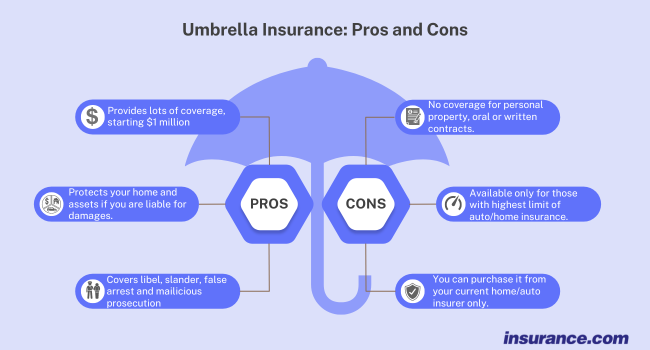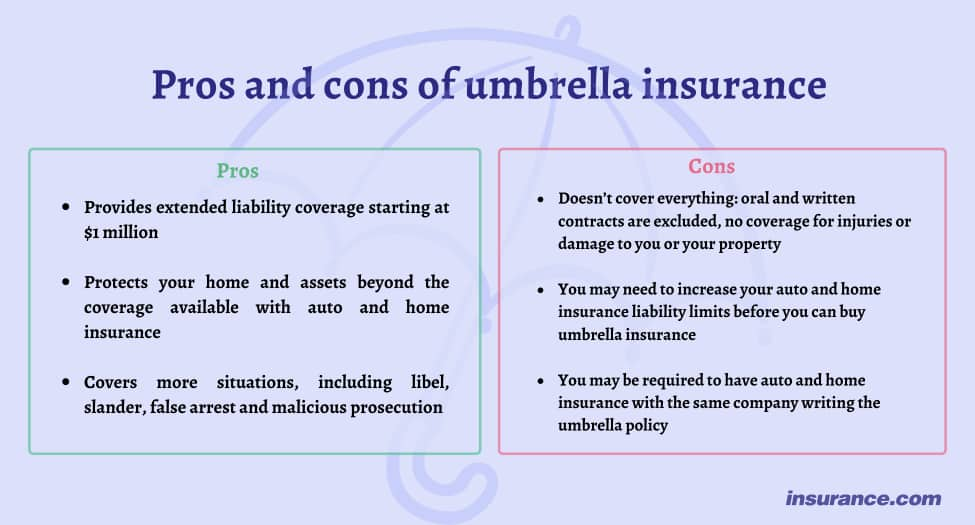
Umbrella insurance offers a much larger limit for personal liability that can protect you from a major claim, but it requires carrying higher limits on underlying policies. That means you’ll be paying more for insurance overall.
Last updated: Jul 18, 2024 Compare quotes in less than 5 minutes
Written by Leslie Kasperowicz
Executive EditorLeslie Kasperowicz is an insurance expert with four years of direct agency experience and over a decade of creating educational content to help insurance shoppers make confident, informed decisions.
Why you can trust Insurance.comAt Insurance.com, we are committed to providing the timely, accurate and expert information consumers need to make smart insurance decisions. All our content is written and reviewed by industry professionals and insurance experts. Our team carefully vets our rate data to ensure we only provide reliable and up-to-date insurance pricing. We follow the highest editorial standards. Our content is based solely on objective research and data gathering. We maintain strict editorial independence to ensure unbiased coverage of the insurance industry.
Umbrella insurance is an obvious choice for some people, especially those with a high net worth or who have a lot of liability risk.
"The benefits of umbrella insurance are to offer additional liability protection beyond what you might have under your auto and/or homeowners policies. Umbrella insurance is a relatively low-cost insurance, relative to the amount of coverage," says Patrick A. Cozza, executive in residence at Silberman College of Business, Fairleigh Dickinson University.
If you’re not sure if you need umbrella insurance or exactly how umbrella insurance works, start by taking the time to learn more about this type of additional liability coverage. And once you’re ready to think about buying an umbrella policy, you can make your final decision by looking at the pros and cons of umbrella insurance coverage.
There are both pros and cons to buying an umbrella insurance policy, although for most people the benefits outweigh the disadvantages. Umbrella insurance covers much more than either your auto or home insurance, but there are some caveats.


Anyone with a high net worth should buy umbrella insurance, but if you’re not sure, it’s best to consult with a financial advisor. Liability claims can easily exceed auto and home policy limits, and those with a lower net worth may be less able to handle additional court costs or judgments.
However, there are costs involved in buying more coverage, so take the time to be sure it’s right for you. "Like most insurance, it's best to shop around for the lowest premium," Cozza says.
We've gathered real questions from real people about umbrella insurance to provide you with expert answers.
It might be cheaper, but it also might not give you the coverage you need. First, it's important to note that many umbrella insurance companies will require that you increase your underlying auto and home limits to the maximum available before you can buy umbrella insurance. So you may have to pay more either way. Second, umbrella insurance offers much higher limits that are available on home and auto insurance. To get the amount of coverage you need, umbrella insurance may be the only option.
Finally, home and auto insurance limits can't be combined; if a claim against your home insurance exceeds your limits, you can't use your auto insurance liability coverage to cover the excess; only umbrella insurance can do that. So, while it may be cheaper to simply increase your auto and home insurance limits, it doesn't provide the same level of coverage.
Umbrella insurance provides a much higher level of liability protection than either home or auto insurance against lawsuits. It will protect your assets in the event of a major claim against you and protect you from more situations than any other policy.
In general, you should consider umbrella insurance if your net worth exceeds the underlying limits on your home and auto policies. It's also important to consider not just current net worth but future income, which can be impacted by a judgment against you. If you're not sure, speak with a financial advisor.
It's never a bad idea to have umbrella insurance, but it is an added cost so it's worth exploring your needs. Whether or not you need umbrella insurance depends on a lot of personal factors. There's really no average person when it comes to buying umbrella insurance. Your assets, risk level and tolerance for risk all come into play, so it's important to sit down with a financial advisor to examine your situation and decide if umbrella insurance is right for you.